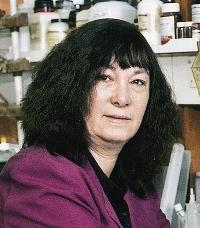Home > Press > New 'bubble' targets only cancer cells
 |
| This is Professor Rimona Margalit of Tel Aviv University.
Credit: AFTAU |
Abstract:
For millions of Americans with cancer, the side effects of chemotherapy and other treatment drugs can be devastating. But new drug-delivery research based on nano- and microtechnology from Tel Aviv University might provide much-needed relief, as well as more effective cancer treatment.
New 'bubble' targets only cancer cells
Tel Aviv, Israel | Posted on February 19th, 2009New drug delivery technology developed by Prof. Rimona Margalit of Tel Aviv University's Department of Biochemistry allows drugs to target cancer cells specifically, leaving surrounding healthy cells intact and reducing the painful side effects of chemotherapy. The science utilizes tiny bubbles, visible only through powerful microscopes, that contain payloads of therapeutic drugs.
"This development is on the leading edge of the new frontier of drug delivery and cancer treatment," says Prof. Margalit. "Bubble technology can also be applied to other medical conditions, including diabetes, osteoarthritis, wounds, and infectious diseases. In twenty years, it could be widespread."
Target: Cancer
Currently, cancer drugs travel throughout the body delivering powerful medication to all the cells they encounter, both healthy and cancerous. When healthy cells are damaged by unnecessary medication, a patient can experience unpleasant side effects ranging from hair loss to nausea. More worrying are further health risks due to the damage that the medication does to the patient's immune system.
Called "drug carriers" recent reports of Prof. Margalit's new technology applied in both cancer and osteoarthritis therapies were published in Nature Nanotechnology, and in the Journal of Controlled Release (2008). The technology allows cancer treatment medication to be placed inside tiny bubbles so small that millions fit along a single inch. The surface of the bubbles contains an agent that allows them distinguish cancer cells from healthy ones. When the bubbles "recognize" a cancer cell, they deliver the medication they're carrying to that cell.
The positive results are twofold: More of the drug gets directly to the cancer cells, enhancing the effectiveness of the treatment, and healthy cells continue to function normally, protected against the painful side-effects of the medication.
Economics, Not Science, Is Researchers' Next Challenge
Prof. Margalit's drug carrier technology has already performed well in animal model studies. The next step is to apply the technology to humans. "Economics is the hold-up, not the science," explains Prof. Margalit, who is in the process of finding a pharmaceutical company to invest in the research.
Although the technology is still a decade or more from clinical trials, this promising discovery offers new hope in oncology.
####
About American Friends of Tel Aviv University
American Friends of Tel Aviv University (www.aftau.org) supports Israel's leading and most comprehensive center of higher learning. In independent rankings, TAU's innovations and discoveries are cited more often by the global scientific community than all but 20 other universities worldwide.
Internationally recognized for the scope and groundbreaking nature of its research programs, Tel Aviv University consistently produces work with profound implications for the future.
For more information, please click here
Contacts:
George Hunka
212-742-9070
Copyright © American Friends of Tel Aviv University
If you have a comment, please Contact us.Issuers of news releases, not 7th Wave, Inc. or Nanotechnology Now, are solely responsible for the accuracy of the content.
| Related News Press |
News and information
![]() Simulating magnetization in a Heisenberg quantum spin chain April 5th, 2024
Simulating magnetization in a Heisenberg quantum spin chain April 5th, 2024
![]() NRL charters Navy’s quantum inertial navigation path to reduce drift April 5th, 2024
NRL charters Navy’s quantum inertial navigation path to reduce drift April 5th, 2024
![]() Discovery points path to flash-like memory for storing qubits: Rice find could hasten development of nonvolatile quantum memory April 5th, 2024
Discovery points path to flash-like memory for storing qubits: Rice find could hasten development of nonvolatile quantum memory April 5th, 2024
Nanomedicine
![]() New micromaterial releases nanoparticles that selectively destroy cancer cells April 5th, 2024
New micromaterial releases nanoparticles that selectively destroy cancer cells April 5th, 2024
![]() Good as gold - improving infectious disease testing with gold nanoparticles April 5th, 2024
Good as gold - improving infectious disease testing with gold nanoparticles April 5th, 2024
![]() Researchers develop artificial building blocks of life March 8th, 2024
Researchers develop artificial building blocks of life March 8th, 2024
Discoveries
![]() Chemical reactions can scramble quantum information as well as black holes April 5th, 2024
Chemical reactions can scramble quantum information as well as black holes April 5th, 2024
![]() New micromaterial releases nanoparticles that selectively destroy cancer cells April 5th, 2024
New micromaterial releases nanoparticles that selectively destroy cancer cells April 5th, 2024
![]() Utilizing palladium for addressing contact issues of buried oxide thin film transistors April 5th, 2024
Utilizing palladium for addressing contact issues of buried oxide thin film transistors April 5th, 2024
Announcements
![]() NRL charters Navy’s quantum inertial navigation path to reduce drift April 5th, 2024
NRL charters Navy’s quantum inertial navigation path to reduce drift April 5th, 2024
![]() Discovery points path to flash-like memory for storing qubits: Rice find could hasten development of nonvolatile quantum memory April 5th, 2024
Discovery points path to flash-like memory for storing qubits: Rice find could hasten development of nonvolatile quantum memory April 5th, 2024
|
|
||
|
|
||
| The latest news from around the world, FREE | ||
|
|
||
|
|
||
| Premium Products | ||
|
|
||
|
Only the news you want to read!
Learn More |
||
|
|
||
|
Full-service, expert consulting
Learn More |
||
|
|
||








